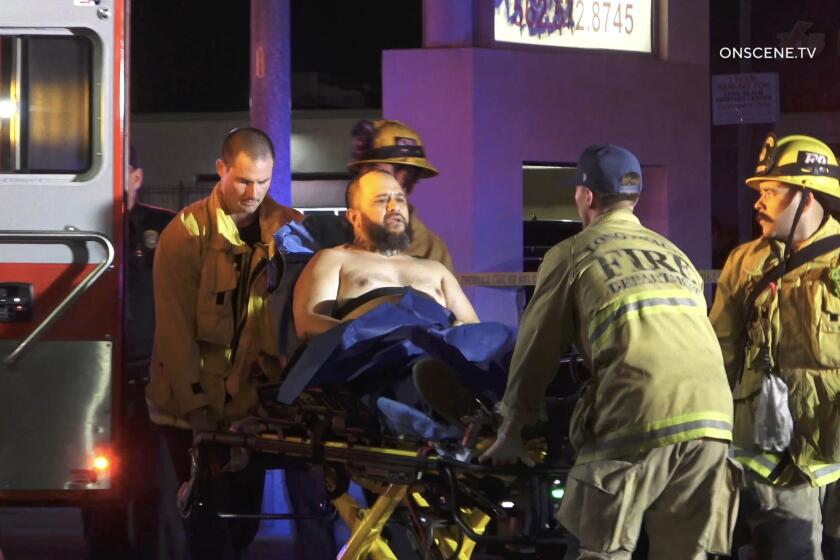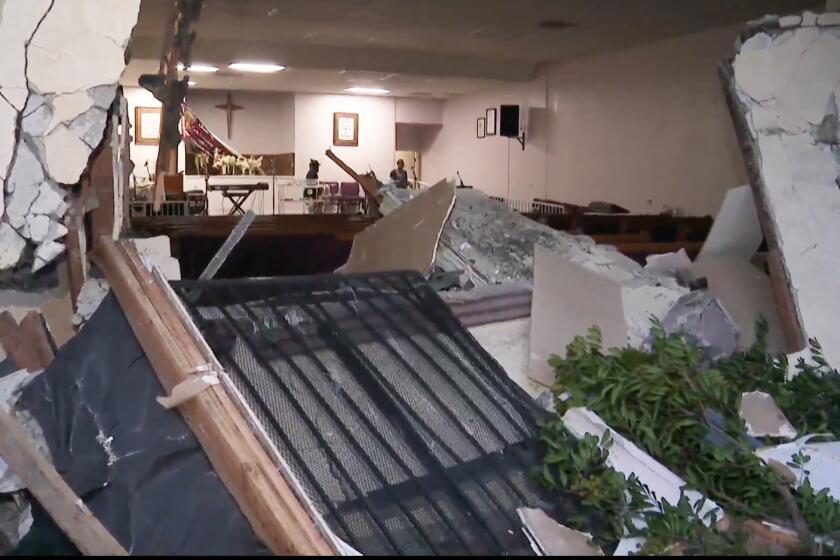Defendant in Base Fraud Accuses Others : Point Mugu: Joseph Vach implicates civilians in the purchasing scandal and alleges assault.
The day after a federal judge ordered five men to prison for their role in the Point Mugu purchasing fraud scandal, Lt. Cmdr. Sean Corrigan wrote an internal memo to the employees he supervises at the big Navy base.
“Our integrity has been compromised,” said Corrigan, the base’s assistant public works officer. “Some of our customers are going to say they always knew we were bad.
“To the extent possible, let’s try to move on, doing the right thing by our customers and the taxpayers.”
That may be easier said than done.
In papers recently filed in federal court in Los Angeles, one of the convicted defendants, Joseph Martin Vach, laid out a road map for the government to follow in its continuing investigation of the scandal.
Vach, who was a civilian planner and controller in the base’s public works section, accused several current and former Point Mugu civilian employees and a couple of off-base vendors of participating in the fraud scheme.
“I did not create the system,” Vach wrote in a 16-page letter to a federal probation officer. “They kept telling me, ‘It’s OK, go along with the program. Everybody does it.’ ”
Vach, 50, of Camarillo, a former sheet-metal mechanic, also contends in the court papers that he was physically and verbally assaulted in separate incidents by two individuals when he threatened to blow the whistle.
Ultimately, Vach and others began cooperating with government investigators digging into the fraud conspiracy. What was uncovered was a pattern of criminal activity that involved civilian employees at the Point Mugu Naval Air Weapons Station who looked upon illegal gratuities, bogus orders, kickbacks, phantom companies and bid-rigging as a way of life.
And while the government’s three-year investigation focused on a period between 1984 and 1989, the fraud’s roots actually extended back to the 1970s, according to court papers and interviews with investigators and others on and off the base.
“A case of booze a week was nothing for vendors to give personnel on the base,” one former base employee, who requested anonymity, told The Times.
Another source said in an interview that shipments of plywood, paint and tools ordered for the base often disappeared when employees snatched them for their own private off-base use.
“It used to be that a vendor would sit in a boss’s office for half an hour and the boss would walk out with a bag that night to his car,” the source said. Inside the bag, he said, might be a toaster, a tool or a hunting knife. Cash bribes, he said, were usually handled off-base and were camouflaged through inflated purchasing orders.
And worse, he said, the thievery continued this year even as the government investigation moved into high gear. For instance, he said, rakes and shovels, purchased on a Navy credit card to clear debris after a winter storm, were illegally taken home by some civilian workers.
In all, $778,000 in fraudulent sales to the Navy base has been accounted for--but investigators say the figure could go much higher.
No military hardware was involved in the scheme, and no military personnel have been accused of participating in the conspiracy.
Only a fraction of the 4,100 civilians employed on the base have been convicted or are suspected of wrongdoing. But a few bad apples have tarnished Point Mugu’s image, said Scott Miller, the base’s chief counsel.
“From the admiral’s standpoint, it makes the whole command here look like criminals and bad people,” he said. “We do good work here and we want to make sure the public knows it.”
Some of the civilians accused by Vach as participating in the fraud still work at the base and hold positions of responsibility.
Named by Vach as major players in the fraud conspiracy were Norman R. Nix, Hank Jurutka, Dennis Spock, Linda Katz, Rudy Alcantar, Butch Henry, Barney Nelson and Tony Ditzhazy.
All except Nelson and Ditzhazy are current or former base employees. Nelson and Ditzhazy have been suppliers. All eight are residents of Ventura County.
None of those named by Vach as accepting bribes, kickbacks or rigging bids have been charged by the government with any wrongdoing.
All of them held--or still hold--civilian positions of responsibility in the base’s maintenance or procurement areas.
In their defense, those accused by Vach declared that he has no credibility and that he repeatedly lied in the letter to save his own skin.
If that was the case, it didn’t work.
Like the other four defendants, Vach must start serving a two-year prison sentence next month.
Federal investigators won’t comment on whether they are investigating Vach’s hit list, or anyone else. All they will say is that the Nov. 30 sentencing of the five defendants did not end the criminal inquiry.
“The investigation is ongoing,” Assistant U.S. Atty. Patricia A. Beaman said about the investigation that she is spearheading with the Internal Revenue Service, the Postal Inspection Service and the Naval Investigative Service.
Also, it has been learned that military authorities at the base are contemplating administrative action against some of the civilians who work there, separate from any contemplated action by the U.S. attorney.
Although not criminally charged, employees could be reprimanded, suspended or fired. They would then have an opportunity to appeal through an administrative proceeding.
“My goal is if people are involved in this, I’m going to nail them,” said Capt. Paul J. Valovich, the base’s commanding officer who also oversees the public works section that employs civilians in non-military roles to maintain the base.
“This is not a vendetta or a witch hunt. They’re innocent until proven guilty,” he said.
Still, a number of workers who rubbed shoulders with their five convicted colleagues are not reassured by Valovich’s statesmanlike “innocent until proven guilty” comment.
“The atmosphere is nervous,” said R.C. Janson, a Navy Investigative Service special agent who has interviewed a number of employees on the base. “People are well aware that the investigation is continuing.
“The good guys are living with it. The bad guys are nervous,” he said.
When informed this week of Vach’s accusations, now a part of the public court record in the case, Nix, a procurement analyst who works with small-business vendors, said he told Janson that he would take a lie detector test to clear his name.
“I have a reputation in my Oxnard neighborhood, I have standing in the small-business community,” said Nix, 59, who has been employed at the base since 1974. “I resent the allegations.”
Vach accused Nix of originally selling him on the idea that he--Vach--could get away with wrongdoing.
“I knew it was wrong, but I was drawn into it in 1984 by one purchasing agent, Norman Nix, and certain vendors and supervisors,” Vach said in his letter of Nov. 16 to a federal probation officer.
In his allegations against Nix, Vach declared it was Nix who “showed me how he inflated requisitions in order to get personal items. Some of the items Nix got me were liquor, a TV, car repairs and miscellaneous tools that I desired. . . .
“Nix had his own scheme going at the same time we did, and he was using his own vendors to receive gratuities.”
On one occasion, Vach said, “He (Nix) got a complete stereo set from B & J Marketing,” an off-base vendor.
“This is all a bunch of lies,” Nix said of the Vach allegations. “I guess he was just grasping for straws.”
B & J Marketing is owned by Nelson, an Agoura resident who said he has been supplying the Navy with commercial items for 25 years.
“It’s not true,” said Nelson, 77. “I have a little more sense than that. I certainly am not going to jeopardize my business with the base.”
Joe Ingber of Los Angeles, an attorney who represents Nelson, said his client unequivocally denies ever giving cash gifts to any government employee as a basis for business with the federal government.
“Accusations by a convicted felon of any misconduct are totally false,” he said.
Vach alleged that even his boss at the base, Jurutka, was on the take.
Jurutka, a Ventura resident, was a maintenance general foreman at the base. He recently retired.
“Hank Jurutka took cash and merchandise and kept quiet about the things he took,” Vach said in his letter. “He did ask me to order pipes for his avocado orchard in Ventura, as well as special camera equipment.
“He was getting a kickback from almost every order I knew about.”
Jurutka, 60, who worked at the base for 27 years, declined to discuss the charges. “I have no comment on it right now,” he said.
Involved with Jurutka in passing around envelopes containing cash was Linda Katz, 44, of Oxnard, a lead purchasing agent who processes vendor orders, Vach alleged in the letter.
Vach said he was repeatedly approached by Katz for cash. Katz, along with two other convicted defendants and Jurutka, was involved in the bribery end of the conspiracy.
” . . . In 1984, I received at least seven to nine thick envelopes that were addressed to Linda Katz and contained cash,” Vach said. “For every false or inflated invoice submitted, Linda Katz received a kickback, she was part of the split. . . .”
For her part, Katz, who was hired by the base in 1969, denounced Vach as “a liar. I don’t know what kind of scam Joe (Vach) had going over there. I work in purchasing.”
Katz said she and her husband, Robert, 44, never profited from bribes or kickbacks. She said they live amid Spartan surroundings in a modest house in Oxnard.
“I’m driving an old car (1981 Dodge), I’m living in an old home (a four-bedroom house that she said the couple rents for $975 a month).”
Vach alleged that he was confronted by Robert Katz last January in a boiler room on the Navy base, and that Katz “said he would hurt me and my family if I didn’t keep my mouth shut.”
Robert Katz said that is not true.
Vach also stated in the court papers that Alcantar, head of the base’s public works maintenance division, physically assaulted him in September, 1991, when the government began issuing subpoenas in the fraud case.
“He . . . ordered me into his office and got very upset,” Vach said. “He said, ‘I told you to keep your goddamned mouth shut.’. . .
“He grabbed me by the shirt, held me against a wall and shook a fist in my face. . . . When I suggested the office might be bugged, he took me outside to continue the heated conversation and his threats.”
Alcantar, 46, of Oxnard, who has worked at the base for 25 years, said Vach was “slightly a liar. I never done nothing to him.”
Even a Ventura law enforcement official got caught up in the fraud scheme, Vach said in the court filing.
Ditzhazy, 53, of Camarillo was a Ventura County sheriff’s deputy until he retired last April after 30 years of service. Vach alleged that Ditzhazy supplied “cash and material items” to Gary Roberson, who along with Vach were the two Point Mugu “insiders” sentenced to prison.
“Tony Ditzhazy supplied jackets and team bags for my soccer team, and asked me to cover for them by writing false invoices,” Vach alleged.
Ditzhazy said he had no comment on the allegations. He referred a caller to his lawyer, Howard Beckler of Los Angeles. Beckler declined comment.
Spock, another accused by Vach, recently left the base, where he was a planner and estimator. “He saw the system of false invoices in operation, and began to prepare such false paperwork on his own initiative,” Vach alleged.
Spock could not be reached for comment.
Vach is a stocky man who said he has been under so much stress from investigators and his subsequent conviction that his hands sometimes shake uncontrollably. He said he has no answers for how he got involved in the scheme.
“I asked myself that question 101 times and I wish I could tell you,” he said in an interview at his Camarillo residence.
“I didn’t really feel that it was hurting anybody. You know, it was strictly material items. You didn’t feel like you were stealing.
“Boy, I tell you, I should have quit that first time. . . . It should have never happened. It should have never happened.
“And God, if I could do it over. . . . “
Because of Vach’s prior health problems, he received $1,200 a month in medical disability pay from the government after he left the base on April 30. But two days after his Nov. 30 sentencing, the government reversed its decision and stopped the checks.
Valovich brushed aside the issue of Vach’s disability pay, declaring he has no sympathy for him.
“That guy was a crook,” Valovich said. “He cheated the government for a long period of time. He willingly took part in this thing. I can’t say I am upset about that at all.”
Vach and the other four convicted defendants were ordered to begin serving their prison sentences on Jan. 12.
More to Read
Start your day right
Sign up for Essential California for news, features and recommendations from the L.A. Times and beyond in your inbox six days a week.
You may occasionally receive promotional content from the Los Angeles Times.





